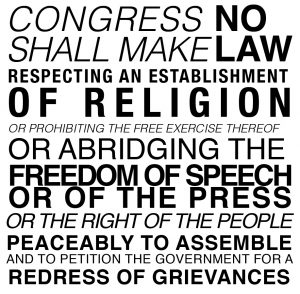What’s the state of the First Amendment?
November 13, 2019
Each year the Freedom Forum Institute, in conjunction with the Newseum, conducts an annual survey to gauge American attitudes toward the First Amendment; this year’s results exhibited a mix of positive and negative trends.
While more Americans can recall at least one freedom guaranteed by the First Amendment than the previous two years, a growing number also believe the Amendment goes too far in its protection of free speech.
 The survey interviewed 1,007 adult respondents, finding that only 64% of respondents could recall freedom of speech, and less than half of all respondents could recall any of the other freedoms guaranteed under the First Amendment.
The survey interviewed 1,007 adult respondents, finding that only 64% of respondents could recall freedom of speech, and less than half of all respondents could recall any of the other freedoms guaranteed under the First Amendment.
The Freedom Forum Institute’s First Amendment Center President Ken Paulson said the results show that most Americans take their rights for granted.
“Unfortunately, our schools are hard-pressed to include the First Amendment in their curriculum,” Paulson said.
“Almost any American could be stopped in the street and recite the pledge of allegiance, but they don’t know what their five freedoms are.”
UW Oshkosh communications professor Tony Palmeri, who teaches a class on the First Amendment, said the results mirror what he sees in class, where most students know the amendment ensures freedom of speech; but very few know the amendment protects freedom of the press, religion, assembly and petition.
He said when people don’t know their rights, they can’t exercise them, meaning that when people don’t know they have the right to assemble and petition their grievances to the government, protest is viewed as radical.
“There’s nothing radical about it; it’s as American as apple pie,” Palmeri said. “It is your first amendment right. Jefferson and [the founding fathers] would’ve said it’s your responsibility.”
While only 1% of respondents could remember all five freedoms, 71% could recall at least one freedom in 2019, which is an 11% increase from 2018.
Palmeri said the increase could be, in a weird way, thanks to President Trump’s continued assault on the media.
“I think that the Trump administration, either wittingly or unwittingly, has sparked more discussion about our freedoms. Whereas in the Obama years, there didn’t seem to be this daily need to discuss what our government was doing,” he said
The survey also found that a growing subset of Americans believe the First Amendment goes too far in the rights it guarantees, 29% in 2019, as opposed to 23% in both 2017 and 2018.
Palmeri believes the first amendment doesn’t go far enough in its protections of free speech, which can lead to self-censorship.
“If the government is saying free speech means they can’t prevent you from speaking, you then have to worry about, well then what’s going to happen once I do speak,” Palmeri said.
Journalism professor Miles Maguire, who teaches a media law class, said he can see where the people who think the First Amendment goes too far are coming from, as it’s tough for a public official or public figure to win a libel lawsuit.
He said there have to be limits on free speech in different circumstances, for example, he believes that individuals shouldn’t be limited in political discourse, but corporations should.
“I’m not comfortable with the idea that corporations are people or that they should enjoy the same political speech rights that any other human being should enjoy,” Maguire said.
In terms of social media and free speech, the survey found that 65% of respondents view banning someone from social media as violating their right to free speech.
Palmeri equated social media to the 21st century version of the public square, a place where people can share ideas and information.
He believes banning political speech on social media could have disastrous consequences, explicitly taking aim at Twitter’s decision to ban political advertising because it could lead to more extensive bans on political speech.
“If I could talk to Mark Zuckerberg and Jack Dorsey, I would say ‘don’t ban political communication; rather you guys should be leading the movement for media literacy,’” Palmeri said.
In terms of the news media, the survey found that 72% of Americans believe the press should act as a government watchdog. However, only 48% of Americans think the news media tries to report accurately and without bias.
Maguire believes the declining amount of trust people have in the media could be due to the media’s relatively recent failures. He said Sept. 11, 2001, was the defining event of this century and led the media to wear kid gloves when dealing with the Bush Administration.
He said the media dropped the ball when it came to the Iraq war, which was started because the government falsely alleged Iraq acquired weapons of mass destruction.
“Where was the watchdog media then warning us about what was going on? There were a few voices questioning whether there were weapons of mass destruction, but they were few and far between,” Maguire said. “The media screwed that up.”
Maguire said the lack of trust in the news media is an emotional response to the times we’re living in, where the United States’ status around the world is declining, the earth is warming and the middle class is facing economic stagnation.
“When people are scared, anything can happen,” Maguire said. “It’s really important to reassure people about the future.”
To rebuild trust in the media, Maguire suggests that journalists fight for the working class.
“When the news media is not tied into the interests of its core readership, its core readership is going to go away,” Maguire said.













